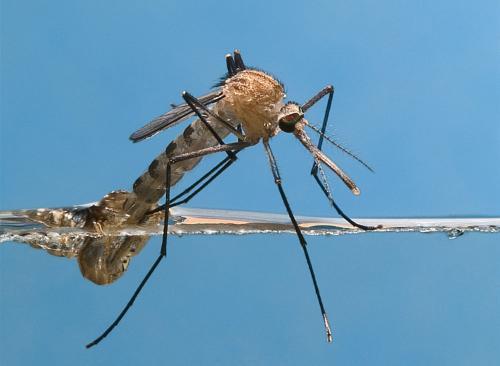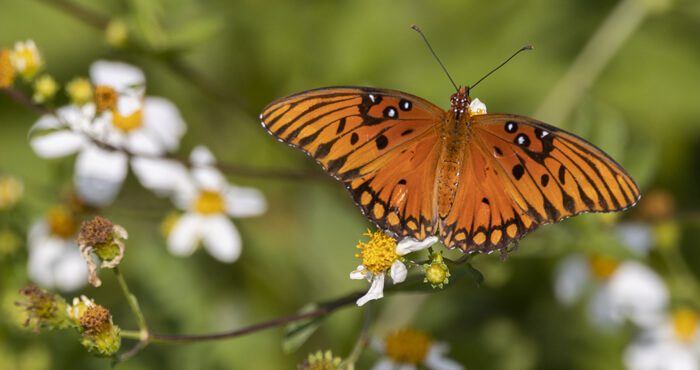
Mosquitoes And Repellents
Mosquitoes are troublesome pests that can cause itchy bites and transmit viruses. The best way to avoid being bitten is to stay clear of mosquito-infested areas and wear protective clothing and insect repellent.

Mosquito Bites
Female mosquitoes feed on blood to help their eggs develop. When mosquitoes bite, they release saliva into the bite area. Allergic reactions to the saliva cause the itchy bumps and swollen hives some people get after being bitten.
If a mosquito is carrying a virus, that virus can be transferred to humans through the mosquito’s saliva. In Florida, these viruses can cause encephalitis or dengue fever.
Mosquito-borne diseases currently of public health concern in Florida include St. Louis encephalitis, eastern equine encephalitis, West Nile virus encephalitis, and dengue.
Preventing Mosquito Bites
Avoid Mosquitoes
The varieties of mosquito that carry encephalitis have their peak activity around dusk and dawn. The insects prefer calm, shady, and humid areas.
Dengue-carrying mosquitoes are daytime biters and usually do not fly far from the containers where they spend their immature stages.
If you are at home, make sure you restrict access to or eliminate standing water areas where mosquitoes can breed (e.g. puddles, fish ponds, bird baths, rain barrels, used tires, leaf-clogged drains, plant saucers).
Also avoid mosquitoes by wearing protective layers. The more skin you cover, the fewer bites you will receive.
Use Topical Repellents
Repellents are used to repel mosquitoes — they do not kill them. The best repellents provide protection for a long period of time per application. Current repellents are either synthetic or plant-derived chemicals available in spray, wipe-on, foam, or lotion formulas.
DEET is a highly effective repellent. “DEET” may not be on a product’s label—its chemical names might be listed instead:
- N,N-diethyl-m-toluamide
- N,N-diemethylbenzamide
In addition to DEET, the CDC added the following to its list of recommended repellents:
- Picaridin
- Chemical name: 1-Piperidinecarboxylic acid; 2-(2-hydroxyethyl)-; 1-methylpropylester
Safety
The EPA has determined that correct and normal usage of DEET is not a health concern. The American Academy of Pediatrics recommends using DEET products with a 30% concentration or less on children. (Insect repellents shouldn't be used at all on children younger than 2 months old.)
"Natural" repellent alternatives are not necessarily safe repellent alternatives. These products contain plant oils that can be toxic and irritating in high concentrations just like synthetic chemicals. Always follow label directions.
For safe use of repellents, consider the following:
- Only use repellents approved by the EPA. (The container should have an EPA-approved label and registration number.)
- Follow label directions.
- Repellents differ in application frequencies. Do not over apply.
- Only apply repellents to exposed skin, not skin covered by clothing.
- Do not apply to mouth, eyes, cuts and wounds, or sunburned or irritated skin.
Repellents & Sunscreen
The use of repellents that are combined with sunscreen is not recommended. Sunscreens are intended for frequent and liberal application, which may lead to over applying included repellents.
Apply sunscreen first, then repellent to make sure that each product works as intended.
Ineffective Ways to Prevent Bites
Sound Devices
There is no evidence that sound-emitting devices will repel mosquitoes.
Eating Certain Foods
There is no scientific evidence that eating garlic, vitamins, onions, or any other food will make you less attractive to mosquitoes. A complex interaction of many chemical and visual signals determines mosquitoes’ attraction to you. For some individuals food is a determining factor, but it may not be for others.
Mosquito Control Methods
Bug zappers use UV light to lure mosquitoes into an electrocuting trap. Studies have determined they do not reduce the amount of mosquitoes and they kill other bugs, such as moths and beetles, more than mosquitoes.
Bats and purple martins will eat mosquitoes; however, they have a varied diet, and mosquitoes only make up a small portion. Birds and bats cannot significantly reduce numbers and control mosquito populations during peak abundance.
Adapted and excerpted from:
J. Rey, The Mosquito (ENY-727), UF/IFAS Entomology and Nematology Department (rev. 07/2011).
P. Koehler, R. Pereira, R. Allen, Use and Application of DEET Repellent (ENY-260), UF/IFAS Entomology and Nematology Department (rev. 07/2011).
C. R. Rutledge, J. Day, Mosquito Repellents (ENY-671), UF/IFAS Entomology and Nematology Department (Archived).
C. R. Rutledge, Mosquito Control Devices and Services for Florida Homeowners (ENY692), UF/IFAS Entomology and Nematology Department (Archived).
Sustainability And Conservation
RESOURCES
Hot Topics
UF/IFAS Publications
- Use and Application of DEET Repellent
- Hurricanes and Mosquitoes
- Eastern Equine Encephalitis
- St. Louis Encephalitis: A Florida Problem
- West Nile Virus
UF/IFAS Sites
Other Sites & Publications
- Insect Repellent Use and Safety FAQs—CDC
- Insect Repellent Search—EPA
- Insect Repellents—HealthyChildren.org



.jpg)

.jpg)